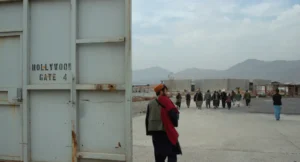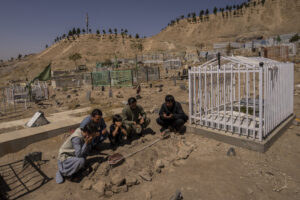Illegal Wars: The New American Way
With dubious legal sanction in domestic or international law, the U.S. military is engaged in active combat in at least seven countries. A U.S. Army soldier patrols with Afghans in the village of Yawez in Afghanistan in 2010. (U.S. Army / CC BY 2.0)
A U.S. Army soldier patrols with Afghans in the village of Yawez in Afghanistan in 2010. (U.S. Army / CC BY 2.0)
[T]he President is authorized to use all necessary and appropriate force against those nations, organizations, or persons he determines planned, authorized, committed, or aided the terrorist attacks that occurred on September 11, 2001, or harbored such organizations or persons. … —S.J. Res. 23 (107th): Authorization for the Use of Military Force (AUMF), Sept. 18, 2001
The President is authorized to use the Armed Forces of the United States as he determines to be necessary … in order to … defend the national security of the United States against the continuing threat posed by Iraq. … —H. J. Res 114 (107th): Authorization for the Use of Military Force Against Iraq, Oct. 18, 2002
It’s all so obvious to a detached observer. Nonetheless, it remains unspoken. The United States of America is waging several wars with dubious legal sanction in domestic or international law.
The U.S. military stands astride the Greater Mideast region on behalf of an increasingly rogue-like regime in Washington, D.C. Worse still, this isn’t a Donald Trump problem, per se. No, three successive administrations—Democratic and Republican—have widened the scope of a global “war” on a tactic (terror), on the basis of two at best vague, and at worst extralegal, congressional authorizations for the use of force (AUMF). Indeed, the U.S. is veritably addicted to waging undeclared, unwinnable wars with unconvincing legal sanction.
Despite 17 years of fighting, dying and killing, there have been no specific declarations of war. Instead, one president after another, and hundreds of derelict-in-their-duty congress members, have simply decided on their own that a vague resolution, rubber-stamped while the rubble in New York was still smoking, authorizes each and every conflict in which America’s soldiers—and many more civilians—continue to die. This AUMF authorized the president to kill or capture those who perpetrated the 9/11 attacks, but, well, few of America’s current adversaries had anything to do with that.
If that doesn’t seem sufficient, Washington points to the only other congressional framework for perpetual war, the long-ago discredited war resolution, which sanctioned George W. Bush’s deceitful conquest of Saddam Hussein’s Iraq. But Saddam is dead and his regime gone, replaced by a U.S.-imposed chauvinist Shiite government which is now (tenuously) sovereign in Baghdad.
The specific circumstances surrounding that war resolution have passed.
So, you ask, how can, for example, war in Yemen or Somalia, be justified on the resolution’s account? Because the policy elites don’t care about logic or rational deduction, that’s why. It’s a convenient ruse, and they assume we’re not paying attention.
And the rest of us, well, we stay mostly silent, wrapped up with trying to earn a living in America’s new Gilded Age, its vastly unequal economy, and remain distracted by fancy handheld computer technology. They, the ones who act in our name—liberal and conservative policymakers alike—count on your apathy. They don’t want you to scratch off the veneer of legality and question the basis of each individual forever war in the Mideast. That would be inconvenient, but it is exactly what true citizens must do.
Let’s take a quick regional tour of some of America’s various shooting wars, and critically examine their legal sanction as it relates to the two existing AUMFs.
● How about we begin with the next massive quagmire awaiting the U.S. military in the Mideast: Syria. Almost no one realizes that the U.S. is now the proud owner of approximately one-third of Syria. Sure, we rent it out to various allied, mostly Kurdish militias, but it’s U.S. air power and a few thousand ground troops which make that possible. America got into Syria, ostensibly, to combat Islamic State—a truly brutal group.
Still, strictly speaking, there was no Islamic State in 2001, and there weren’t any Syrians among the 9/11 hijackers. Now, one might argue that Islamic State is a spinoff of al-Qaida, which did attack the United States. Careful though—by 2014, Islamic State had split from the local al-Qaida franchise (the Nusra Front), and the two had become warring rivals. More confusing still, while one could argue the 2001 AUMF covers al-Nusra, the U.S. has rarely attacked it and, indeed, sometimes armed and supplied Islamist elements affiliated with the group. What a twisted legal web Washington has spun.
Still, there the U.S. military now stands, responsible for the hopes, dreams, sustenance and well-being of millions of Syrians. Its troops aren’t going anywhere anytime soon, either. Before Secretary of State Rex Tillerson was canned, he announced that U.S. “troops will remain in Syria”—essentially indefinitely—“to ensure that neither Iran nor President Bashar al-Assad of Syria will take over [these] areas.”
That’s strange. Assad is a brutal monster, sure, but he remains the sovereign ruler of Syria, and, well, technically he didn’t invite the U.S. military into his country. That means, in a certain sense, that only Russia and Iran—purported American adversaries—have any legal sanction in Syria. So, to review, the U.S. military occupies the east of Syria, facing down and one mistake away from a war with Assad, Iran, Russia and Turkey. That sounds risky. Oh, and one more question, do the 2001 or 2002 AUMFs cover the U.S. killing of scores of Russian mercenaries? Because that happened, too, just last month.
● The world’s worst humanitarian disaster zone today is in the Arab world’s poorest country: Yemen. Here, U.S.-backed Saudi planes drop American bombs on Yemeni Houthi rebels from planes fueled in midair by the U.S. Air Force. Though the official count of civilian deaths seemed to stop at 10,000 in 2016, journalist and Yemen specialist Iona Craig, of The Intercept, told me this week on my podcast that the real number probably approaches 50,000.
That’s just the direct, war-related deaths. The bombing and Saudi—and arguably U.S. Navy—blockade also has kicked off a record-breaking cholera epidemic and a worsening famine. Children literally starve to death in Yemen. The Houthis, a Shiite sect from northwest Yemen, had nothing to do with 9/11 and hardly collaborated with Saddam’s Iraq. How, then, can we square U.S. complicity in Saudi terror-bombing with international or domestic law? Short answer: We can’t.
● In Somalia, where the U.S. military has maintained an on-again, off-again presence since 1993, the Air Force bombs and Navy SEAL commandos raid the native al-Shabab militants. A particularly nasty bunch ensconced in a nastier neighborhood, al-Shabab didn’t even exist in its current form in 2001, and certainly had nothing to do with the 9/11 attacks. With no known relationship to Saddam Hussein, it’s hard to see how these Islamist militiamen fall under either AUMF.
● Niger hit the headlines in a big way last year when four Army Green Berets died in a vicious ambush. No one, it seemed, not even superhawk Sen. Lindsay Graham, knew we had any troops there. Apparently, that’s no longer a requirement for the places America sends its soldiers to kill and die. Heck, most Americans had to look up the country’s pronunciation and scramble to find the joint on a map.
Here, as in most foreign interventions in the African Sahel, the U.S. (and France) are being sucked into essentially local tribal, resource or ethnic conflicts that masquerade as transnational Islamism. These desert fighters had nothing to do with 9/11, the local Islamic State affiliate didn’t exist in 2001, and Niger is 3,000 miles or so from Saddam’s old haunt in Iraq.
On the bright side, the U.S. military was kind enough to grant retroactive “imminent danger” pay—a whopping $225 a month—for all the troops in Niger and Cameroon. You see, sometimes Washington doesn’t even know it’s in a barely sanctioned “imminent danger” situation, what used to be called a war, until after the fact.
● Finally, the boondoggle of all boondoggles, the original unwinnable war: Afghanistan. In this case, al-Qaida did once operate there and the broad contours of 9/11 were planned in Afghanistan. That was 2001. By 2002, al-Qaida was all but finished in Afghanistan and had fled to Pakistan and other regional locales. The war didn’t end though, not by a long shot. Seventeen years on, and the U.S. is again ramping up its longest war. Why? Because the stubborn Taliban that once harbored Osama bin Laden won’t surrender.
Honestly, though, let’s call it like it is: America’s chosen nemesis there—the Taliban—is, and essentially always was, a local actor with aspirations confined to landlocked Afghanistan. Most of these illiterate, destitute farm boys have never met any al-Qaida. Truth is, negotiations with the Taliban might convince these folks not to harbor al-Qaida-classic in the future. That wouldn’t serve the Taliban’s local interests, after all, and would bring on the continued wrath of U.S. bombers and commandos. To give a sense of how far off the rails U.S. policy has gone in Afghanistan, American planes started bombing ethnically Uighur Chinese militants last month. Tell me how that crew relates to either of our vague AUMFs? The whole notion is absurd.
Matters are even worse than they appear. There’s no discernible strategy, folks. The U.S. holds a bad hand and is playing it badly. The American people hardly care, media coverage these days is all Russia, all the time, and Congress has these wars on autopilot. Furthermore, seen through foreign eyes—which matter, by the way—there’s a distinct gap between U.S. public pronouncements about liberty and sovereignty and America’s adherence to the international laws governing such ideals.
Behind the standard American-freedom rhetoric, and beneath the surface lies an unspoken truth: The USA flouts international law when it suits American interests and stretches domestic authorizations to their breaking point in the name of perpetual, doomed warfare. We the people are all complicit, until, that is, we demand that Congress do its constitutional duty and specifically approve (or shut down) the forever wars.
Democracy dies in the darkness exuded by the clouds of foreign wars. The fate of the republic—what remains of it—hangs in the balance.
The U.S. may be a republic or an empire. It may not be both. Now is the time for choosing.
The views expressed in this article are those of the author, expressed in an unofficial capacity, and do not reflect the official policy or position of the Department of the Army, Department of Defense, or the U.S. government.
Your support is crucial…With an uncertain future and a new administration casting doubt on press freedoms, the danger is clear: The truth is at risk.
Now is the time to give. Your tax-deductible support allows us to dig deeper, delivering fearless investigative reporting and analysis that exposes what’s really happening — without compromise.
Stand with our courageous journalists. Donate today to protect a free press, uphold democracy and unearth untold stories.









You need to be a supporter to comment.
There are currently no responses to this article.
Be the first to respond.